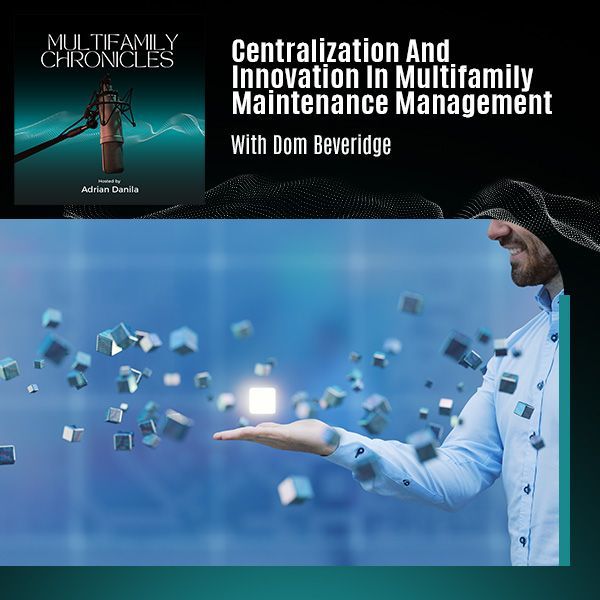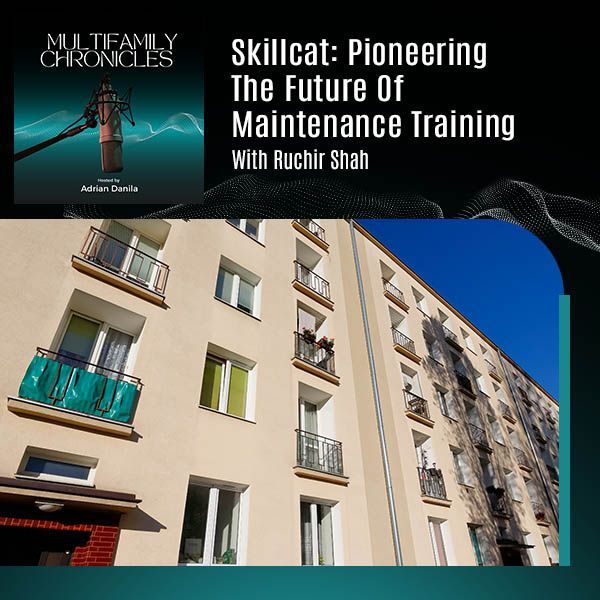Team Building Strategies To Level Up Your Company Culture With Tony Sousa
Your people are one of the most powerful and essential assets you have. By implementing effective team building strategies, you are already securing significant business success. Joining Adrian Danila is Tony Sousa, Regional Manager with Embrey. Tony presents the best practices in employee management, particularly in inviting your people to be vulnerable with their leaders and open to committing mistakes. He also discusses the best approach to reducing burnout in the workplace, the ideal way to design a healthy working environment, and how to smoothen your recruitment process.
---
Watch the episode here
Listen to the podcast here
Team Building Strategies To Level Up Your Company Culture With Tony Sousa
My guest is Tony Sousa. He is a Regional Manager with Embrey Management based in San Antonio, Texas. Welcome to the show, Tony.
Thanks for having me. I'm happy to be here. I look forward to the conversation.
Let's start by introducing you to the audience. What would you like to share with the audience about yourself, your background, and things you are passionate about?
I work with Embrey Management here in San Antonio, Texas. I'm a West Coaster. I grew up in California and lived much of my life there. I went to school there. I studied there. I got started in the industry there. I had an interesting background prior to multifamily. Some in the arts as well. I have some different skills and talents in my role. I know you have a different background than multifamily as well, and all of that contributes to who we are now and the value we give our companies and teams. I'm passionate about people, culture, and what we do. I love real estate and I feel fortunate to be in the position I am in.
Everybody talks about the Great Resignation, so this is a hot topic. The reason why I invite people like you in executive roles is to catch different angles and different perspectives on different issues. There are maintenance specifics for the most part, but sometimes they are not maintenance specifics. They are general industry specific. Let's start with the Great Resignation. What's your take on it? How did we get here and where do we go from here? How do we overcome this challenge?
It's an interesting road that has taken us here. The pandemic has accelerated individuals’ thoughts about what's important to them, what careers they want, what jobs they like, and the monetary compensation that they think is fair for what they do. The Great Resignation, as they are calling it, is a real thing.
Some companies are facing a tidal wave greater than others. That has much to do with how they handled their people and their culture throughout the pandemic. Those companies and supervisors even more specifically were very people and human-centric in the midst of a scary time in our world. They are seen as less of a transition than those companies that were maybe more callous or focused on protecting their liabilities as a company as opposed to thinking about the people.
Those companies are having much more transition than the latter. You’re questioning, “How do we fix this?” Let me get my magic wand out and utilize it. There's no easy fix. Companies are having to redesign and rethink who they are. All companies are having to do that post-pandemic and define who they are. Not only define what their core principles and values are, they have to find a way to tell the world about them.

The best way to do that is through your employees. If they love where they work, they will tell everybody about it. Those are the best candidates that I get that are referred to us, to our portfolio, and to Embrey. They come to us with great excitement because they have heard wonderful things. I have to evaluate timing and skillset and make sure that it's the right fit. Those are the best candidates to get. Companies have to think about how to get this message of who they are, what their culture is, and what they do best out to the world, and some are doing it better than others.
You said something about the message and how the message is getting out to the public or to the target audience. It's also important to talk about not just getting the message but then the part that comes after getting the message is right. How do we walk that message? How do we turn the message into reality? What's your take on this? What's your experience with a walking culture?
I know a lot of people through social media, here locally, and networking events. People know of me and I know of them. I will use the example of people that know of Embrey and know of me. They have high expectations both of Embrey and of me based on what they have heard. My job, as a regional and working with my teams and alongside Embrey, is to deliver on expectations, and sometimes that's not easy.
Everybody has a different view of things, but I'm speaking to those who think very positively of your organization, view, portfolio, or teams. There's a greater responsibility on those companies and those people to make sure that they fulfill either what the perception or expectation is. I'm fortunate that people reach out to me, interested in being a part of what we are doing here and I feel the burden of responsibility.
It's a good burden but it is a burden of responsibility. I feel the weight of that. Frankly, we don't meet some of those expectations. It happens. It humbles me and it allows me to go back with my teams to say, “How can we better execute and deliver on the brand promise that is to be a part of Embrey Management or a part of my portfolio, their team, or their property?” We have to evaluate how we go about doing things all the time. Taking that approach of consistent evaluation of our processes, culture, and execution only makes you better.
It's very interesting that you brought this point up. People reach out to you because they see it on social media and LinkedIn. They want to become a part of your culture or team. That comes with a lot of responsibility because you got to meet those expectations. I do have a similar experience where many people reach out to me all the time. They are looking for the next best thing for them. Based on the company size and the needs that we had at a company, I'm not always able to come and say, “This is an opportunity for you. We are not large enough to absorb all those people that are coming my way.”
The next thing that I do, I refer them to friends and connections in the industry, but that comes with responsibility, too. I would never refer someone that I had never met in my life. Even if I met them, I would never refer them to a company that is not a great company. People don't have great experiences out there. It's a huge responsibility for us, for people like you and me in our positions to make sure that these people land in a place that treats them well.
It's a great point. I'm probably being a bit modest and so are you. My direct message inbox is often full of people that want to talk or pitch their business. I have even had the extent and you probably have as well. People that don't work for me are asking me to be their mentor. I am incredibly flattered and humbled by those types of messages.
I only have 24 hours in a day and a busy day job. I have a family as you probably know, and so there's a lot to that. The bigger point where we are successful at essentially growing our pipeline, and our companies have done a good job of that as well where other companies and individuals can grow their pipeline. When they go back to thinking about how to attract talent was the origin of some of our discussions during the Great Recession.
It's about reputation. You have to be mindful not only of the message because, over the last few years, there’s also been a lot of messaging, whether it be political messaging or corporate messaging. Messaging is messaging, but delivering that message is essentially your reputation because people will tell other people about you when they have had a great experience at your company, portfolio, or properties. They will also tell a lot of people if they haven't, so that's important. Companies that want to continue to build need to not only get their message out. That's one component of it. That's the marketing component of all of this.
It’s the bread and butter and the day-to-day work. Some people will ask me, “You are out there on LinkedIn all the time. You are a marketing guy and branding guy.” It's not about that. As much as it is, those whom I believe work with me on a day-to-day basis know that I'm the first guy to pick up your call. I'm the quickest guy on text to get back to you when you need me.
My job as a Regional Manager is a support job. I have said this before. My job is to respond to you, give you the tools and resources, or clear out any red tape, bureaucracy, or debris in your way. That is my main job. If I'm not doing that job very well, then so be it. Look for other opportunities, and it's not that I want you to go anywhere.
That leads me to my other point. I don't want to hijack this totally. In this Great Resignation, some people have asked me, “Are you worried about your top talent leaving or getting other great companies coming at them to steal them?” I don't take a second in a day to think about that, and I don't say that arrogantly.
I feel very confident here at Embrey that we give them what most employees want, and those are some simple things. We trust them upon hiring them. We give them autonomy to do their job. We also give them the tools and support to do their job successfully, and we pay them fairly. When you are doing some of those basic things, you don't have to lose sleep that your people are going to leave you, but if you are not doing those basic things, then you should be losing some sleep, recalibrating, and rethinking your strategy.
You and I both are on the same page. This is not some complicated philosophy that we are talking about here. It's about understanding human behavior, doing the right thing, and understanding. My main fascination when it comes to what I do for work is understanding people where they are coming from and trying to meet their expectations. It is more than the technical part because I'm a maintenance.
That's second concern. It does not concern me. I don't lose sleep over that, but I'm very passionate about understanding what the real needs of individuals are. I'm a firm believer that you should be treating people the way they want to be treated. We have the saying, “Treat people like you want to be treated.” That might be true but not everybody wants to be treated like you and I want to be treated.
Everybody's different. That piece of trying to understand the individual, what they have going on in their lives, taking a few minutes to understand, what family they have at home, and what challenges they have. I heard so many times that it's business and you got to leave it at the door. You don't because it's part of your life.
Work is part of your life. Your family is part of your life. You can't leave that at door. It's part of you. You bringing it with you. If that thing is not going well at home, let's see how we can help you out. Let's see how we could support you because if you are going to do better at home, you are going to improve that situation. You are going to do better work, too. It's all interconnected.
This takes work. This is not easy. This is not a puzzle that's easily solvable and the challenge of this puzzle, as you well know and you very well articulated it, is everyone's different. Everybody has a different puzzle to solve. Hiring managers, supervisors, and leaders, those who are good at doing this like yourself and I'd like to think that I'm getting better at this, become more successful as you understand who you are bringing on board. It all starts in the hiring process in understanding, “Is this the person with the right fundamental skillset, not only skillset but emotional skillset that can work well on this team?"
Everybody has a different puzzle to solve. Hiring managers and business leaders must be more careful with the people they bring on board.
If so, we go down this road of round after round sometimes of interviewing. The great companies that are out there from Southwest Airlines to the Chick-fil-A's of the world understand that it's in the hiring process, and then it goes to the training process which is a part of the ultimate process. For companies and individuals to do that hiring process in a very robotic, conventional, old-school way or a very scripted and contrived process, they are missing the whole process that's relevant now.
There's so much going on in post-pandemic. Mental health and so many other things play into this evaluation of who you are bringing on board. You have to have a firm understanding of who you are first as a leader and how you work with individuals. You are right 100%. You have to adapt to them. They don't have to adapt to you. That makes you a better human, leader, and supervisor to be able to adapt yourself to all these different folks.
Become a better leader by learning to adapt to the different people you hire to the team.
Your colleagues will come to you and say, “That's a whole bunch of work and I don't have time for all of that.” That's okay. You don't have to spend the time, but you are going to see the negative results in the short-term, mid-term, and long-term that I'm willing to put in early that we'll see the results in short, mid, and long-term. We are on the same page.
I believe you are making another great point. It's a lot of work at the very beginning, but it's also about doing the right thing. Many times, doing the right thing is not what's convenient and it's not easy. It's super hard. We, as humans, are built that way. We are trying to find the easy way out. The reality is that there's no easy way. You have to put in the time. You have to put in the work.
When it comes to building loyalty amongst your team members, you have to spend time. There's no way around it. This is something I used to say, “You cannot outsource or delegate.” You have to do it in person. When it comes to your team, you can’t outsource and you can't delegate. There's no way around it. If you try to do that, the results will be seen. You are going to have to deal with a lot of ugly situations where people would not feel valued and would not want to stick around.
In those ugly situations on maintenance, it can get ugly from sewer lines to you name it. When they see you physically and literally roll up your sleeves to help them, that's when the bond of the relationship continues to strengthen. They say, “This guy talked a big game in the interview. He said he had my back and he is going to be there for when I need him.”
That opportunity will arise and it usually arises pretty quickly in this business. There's always something that will arise. They either consciously or subconsciously are watching you as a hiring manager, supervisor, and executive to say, “Are you going to make good on that promise that you've made to me in that interview process?” If you do or at least you give your best effort to be there to support, that bond and that relationship continue to grow.
If you do that over time and with frequency, that relationship becomes very strong. To the point I was making, you don't have to lose sleep that people are going to be leaving you because of that human bond and professional bond that you'll have with those individuals. Why would they want to go anywhere else if they are supported, fairly compensated, and have all the tools they need for their job? They are not asking for much more than that. I'm not asking for much more than that and neither are you.
It goes back to the basics. It is not a science. It's not something a philosophical conversation. When you think about it, there are very basic things and solutions to all those challenges that we have. One of the reasons, as an industry, experiencing a very high turnover rate where higher compared with other industries is employee burnout, especially in maintenance. We’ve seen this all the time. In your experience, what would you think are a few ways to avoid or have your team members experience less burnout?
I can't speak as a technician. I can only speak on the office and the leadership side. That's what I will speak to. It has something to also do with my background. We spoke about that a little bit about appreciating hard work, labor, and understanding not everybody is willing to do it and capable as well because some of the work done on the maintenance side is not easy.
On the leadership side, especially on the office side, we can take for granted our maintenance team, supervisors, porters, housekeepers, assistant technicians, and our made-ready individuals. We could almost lullaby ourselves into this endless and thankless demand of made-ready work orders. I try to be very conscious of this every time I make a site visit on a daily basis. I go out of my way to thank them for specific jobs they do, look them in the eye as humans, and tell them, “Thank you. We all have different roles to play, and you are playing your role well. I hope to do the same for you.

You talked about burnout which is essentially emotional and physical. The physical burnout is more manageable. Those on the maintenance side can handle the physicality of the job. When I think of burnout, I think more of emotional burnout. When your tank is empty, in relationships, both personal and professional, it means that you have not been filled up in a way that means something to you.
Some people like great gratitude and awards in front of people. Some people like private thank you’s and appreciation of work. Ultimately, sometimes executives and office leadership forget and take our maintenance teams for granted. That has been my observation over the years. We take them for granted. We don't appreciate them in the same way we do sometimes our office staff, because they do quote “dirtier or tougher jobs.”
We forget they are human like everyone else. They just happen to do different jobs. They need the same praise, support, the occasional pat on the back, and the lunch, dinners, and thank yous that everyone else gets. When you appreciate those individuals, the housekeepers, and supporters, it goes a long way. I have had pretty limited turnover over the last couple of years in those positions because they know my name. I know their name. I know some of their life. I know a few of their kids' names. I asked them about how football season's going and things like that.
As humans and as people, caring about one another goes a long way, but it takes work, and you genuinely have to care about people. You have to look yourself in the mirror as a leader in any industry and say, “Do I care about these people?” If your answer is no, find something else to do, but if your answer is yes, find ways to show that you are. Don't expect the work to be done. Be grateful for the work that is done.

It's great. I'm picking up on a team in our conversation. It all goes back to individualization. Blanket everything doesn't work and it doesn't work for a good reason, because we are all different. We all have different needs. This brings me back to our next topic, training. I feel very strongly about training, needing to be individualized. We are all very familiar with the required training in an industry which is, for the most part, fair housing, preventing sexual harassment, and a couple of other things that everybody has to have.
There's no disagreement there. On my end, they all have to happen. When it comes to technicians, maintenance, and the technical part of the business, we should have individual training. That's my thought. I'd like to take on it. It's not your area of expertise because as we established, you are not maintenance. How would you see some effective methods of training for your teammates on the maintenance site?
You raised some good points. Not a lot of people know, but I used to be a training manager or regional training manager, so I was in the training department. That was both in the office, and I didn't have the expertise to train them on the maintenance side but helped work together with putting structure and formats together.
I agree. Ultimately, you have to have broad training on some of the major liability topics of the day. Training needs to be customized and created around the individual. For someone like you that you are not going to come in and train any of the basic components of the maintenance you know. That comes down to the trainer and the supervisor understanding who they have on their team. What do they already have expertise in and a foundational skillset?
Let's not spend a lot of time there. Some of the other areas, whether it be customer service, technical training needed for certain appliance repairs, or HVAC training. Spend your time because we all have a limited amount of time. Spend your training hours being very specific about the needs of the associate. Whether it be a maintenance technician or whether it be in the office.
I agree with you and most trainers, given all the time in the world or at least the ability to get it all done, would agree, or at least the good ones that you have to target your training towards the individual, not the individual, have to adapt to our training program. We need to adapt ourselves and have a program in place but adapt to the individuals we are bringing on board so that they can get up to speed as quickly as they possibly can to our applications.

Individualized training is the key to effective training. We could throw training at people as much as we want. If it is not based on the business needs on one end and on the other end on the individual's needs. What makes them thrive? Which areas do they believe that they need to be better at? They want to improve. They want to learn more versus us deciding for them what they need to be learning.
I will double down on that, too. Whether it be office or technician, you pinpoint the training that's needed for these individuals. You help them get better in an area they need to get better in. They become more confident and they appreciate you giving them skillsets that they didn't have, and so then they are even drawn more into your program and into your leadership.
They buy in further, they are thankful, and they want to learn and grow more. The theme is not complicated, but it takes work and intentionality. When you are doing that with intention, whether it be training, leading, or whatever you may be doing, you are going to be successful, but it takes work, thoughtfulness, and strategy to go about it.
We have been covering ourselves as managers and what our responsibilities are to our teams. We didn't say it, but I'm going to say it out loud right here. When you are in a management position, you don't have people working for you. You work for your people. Literally, you do work for them. It's been a misconception thinking that, “I got promoted to a management position. I'm the maintenance supervisor now.” I'm going to have a bunch of people doing work for me. That's truly not the case. I'm sure that goes the same way in any management position.
You and I have been talking about building and supporting our team members as an individual. Also, a support system that we need to have in place does not consist of one person. It's a whole support system. It's a whole world out there of support that our teams need to be successful. I wanted to see what's your experience with this. If you have any specifics on the maintenance side, what things have you noticed in a past or current position of being successful at supporting teams in the field? What's your experience with that?
Support is not just coming from the direct supervisor. That's a big part of it and their experience has much to do with their supervisor and their experience with their supervisor. Most companies are large enough to where you have multi-layers of support opportunities or support touchpoint opportunities. That has something to do with office and maintenance leadership.
You also have opportunities for sister properties, other peer maintenance supervisors, or peer technicians to be able to come in there and mentor as a supporting tool as well. I also think support and training departments need to play their role at a higher role and then help facilitate those on the ground or in a pure capacity to be able to be a part of that supporting program.
It's all support. You are not where you are at or I'm not where I'm at if I didn't have the support and love, not only of my professional family but also of my personal family as well. Support is a huge part of life, and if you feel you don't have it, you get scared, defensive, and worried, and you watch your back. There's a paranoia about that if you don't have support.
For those who don't have support professionally or personally, that's a difficult position to be in. I have been in both. You've probably been in both. Fortunately, personally, I have had a great support system through family and both mother and father, grandfather and grandmothers, but also my wife and children. They think dad is Superman. When they think of that, you then become that. If your manager thinks that of their new hires, you also strive to try to meet that expectation.
Everything starts at home for all of us. The type of work that you and I do, without having that support at home, we can't be successful. We can't get too far. Having someone at home understanding what you are going through on a daily basis and the demands of the job makes all the difference in the world. It makes or breaks a career.
It does, and I will tell you. Even now as we speak, I have team members going through some things. Having those heart-to-heart conversations with those individuals, not only for me, continue to humble me to understand that my team is going through things that sometimes I know about and sometimes I don't. Also, it’s allowing me as a supervisor and as a human being to tell them, “It's okay to have a lousy mental day or a lousy emotional day because you are going through something pretty big.”
“That's okay with me as your supervisor. Let's not line up those days to be too many to where it starts affecting the job. You didn't have a great day and your head was fuzzy. You had a hard time focusing. Because of the magnitude of what you are dealing with, that's okay. I support you if you need to take 1 day or 2 as needed to make sure you’re right. If you are not right here, it's going to be hard to be excellent at your job. I know that and you know that.”
Some leaders don't even articulate that enough to them. It takes some emotional vulnerability to tell your managers that it's okay to take a day and it's okay not to be excellent or fuzzy. I'd like to think every single day of my fifteen-plus year career in this business, I have been super sharp. That would be a lie. For me to tell that story to readers but also to my employees and team members, they appreciate authenticity, vulnerability, and honesty. It allows them to be human. When they are allowed to be human and make mistakes, they learn from them. They become a better human in my experience.
When employees are allowed to be human and make mistakes, they actually learn from their experiences and become better people.
You said human throughout our conversation several times. This is what our industry, the society in general needs some more, not just us being who we are, turning down those walls that are between us and others. Instead of trying to build those walls around us, let’s tear them down and expose ourselves for who we really are. You don't have to filter all of your emotions. You don't have to be a robot. It doesn't make you a better person or a better human. Being yourself gives people around you confidence that they could be themselves also. It makes for a great success story.
I agree. Vulnerability is strength, I have said that before. I have had to learn that as an adult because we are in cultures and different countries. We learn what's appropriate norms and where to put walls and where to protect ourselves. Some people come from very dysfunctional environments growing up. Being mindful that our people are allowed to be who they are and supportive of that. At the same time, having that conversation that as a supervisor, my job is to hold you accountable to the job as well.
We'll do that but we could do both. We could support you as a human being and your mental health, but we could also hold you accountable for your job. If you do a great job, out of our way to say thank you. If you are not meeting performance, we'll talk about that. We'll talk about why and how to get you there. If it's not the right fit in time, hopefully, it's a mutual decision. We need more of that, especially post-pandemic. We had mental health issues in this country prior to the pandemic. Unfortunately, the pandemic is now starting to show its ugly head of some of the ramifications of some policies and also some of the things that happened over the last couple of years.
It does. We need to do better. We could do better and we could be better again by showing compassion and kindness.
We are LinkedIn friends. Years ago, early pandemic, I realized what gets the most engagement. You know this because you do a good job of this. What gets the most engagement on your content or your posts is not glossy marketing photos of your properties sometimes, although those are beautiful. Don't get me wrong. What gets the rawest engagement and I find people gravitate to these types of posts or content is the most authentic ones. When I tell people a little bit about my life or a challenge one of my children has had, or put on showcase my beautiful wife as a strong woman, that gets the most engagement.
I'm an observer. I'm a learner in life. I think like you. I see that and what it tells me is that people aren't getting enough of that either at their day job or at home. They are looking for outlets and channels of people like maybe you and I and others that are willing and courageous enough to be vulnerable and allow people to see a little window into their life.
We find this balance of TMI, Too Much Information. It's somewhere in between. Not enough information and too much is the best posts, content, and messages somewhere in between is enough to let you know that I'm human. I have struggles and my family has struggles as well. We are not perfect. At the same time, I'm not going to try to sell you all these fancy things and photos, and my life's perfect.
I never understood that in business when you are expected to answer all the time when someone asks, “How are you?” You have to automatically without even thinking or tapping into your heart or emotions, say, “I'm good,” when you are not. Hopefully, in time that's starting to go away. At the same time, you don't want to tell everyone about your problems. You have to pick and choose whom you talk to, but it's okay.
If you are not doing good, your body language will show that you are not doing good before you say even in words that you're doing good. Those managers and leaders that are connected to their staff will realize regardless of what their words say, maybe they need some additional TLC or some attention and maybe a simple conversation to find out what's going on.
Body language shows what you feel before you even say actual words.
You are right. A lot of the things are into what hasn't been said than in what has been said because we grew up in this type of culture where we are not to share our issues with our supervisors. We are not to tell anything because that might be seen or interpreted as a sign of weakness. Things are changing. I'm seeing an improvement at all levels of society.
I'm super hopeful about the direction we are going into and all the challenges that we have been talking about in our conversation. I only see them as opportunities. They are opportunities for us to do better, be better, and live a better world for those that are coming behind us. If I had to say what I took most out of this conversation is that there’s a lot of positivity. This is not a negative point we are in. It is a point where there's an incredible amount of opportunity. It's what we going to do with it.
That's always the question. I'm excited about the future and what it has to hold for us.
In closing, I'd like to give you the opportunity to share with the audience, something you haven't shared. Whether it is how they could reach out to you, something about your company, some great things that are going on out there, or whatever you'd like to say in closing.
I want to double down on what you said. Despite the challenges that we see or if you watch your local news or national news, you would think that the world's going to hell in a handbasket. If you are living life aware, listening, watching, and seeing your teams and the people around you, there is ample opportunity to make differences. Sometimes little differences that you make go a long way for those individuals.
Hopefully, if anyone reads this episode, they can be encouraged or inspired in some ways to make a difference in their job or at home, with anyone. I'm fortunate to work with a great company here at Embrey, and my job is to pay it forward. To the reference that you made earlier, the company is taking great care of me and so my job is to take great care of my teams as well, and I appreciate that. For people to recognize how important your family and friends are to your mental health and to your job to focus on that as we go forward here in 2022.
This was a real pleasure. I feel very honored to have you on a show. I have been following you for a while. I love your content. We have a lot of things in common. I appreciate you taking the time to share your thoughts with me and with the audience. I hope to get you back soon for a second episode. Everybody, thank you for reading. I hope to see you coming back again soon. Have a great one.





